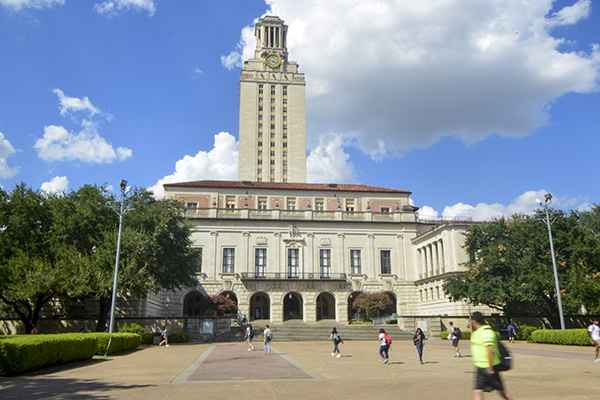Editor’s note: This story is part of The Daily Texan’s coverage of how coronavirus concerns are affecting UT-Austin. Read the rest of our coverage here.
The University does not plan to give any tuition reimbursement for the spring semester and has paused the vast majority of campus research, UT officials said in a briefing on Friday.
Larry Singell, senior vice provost for resource management; Marla Gilliland, director of course development for the College of Liberal Arts; Dr. Terrance Hines, chief medical officer for University Health Services; Mylon Kirksy, senior director of residence life; Kelly Soucy, director of student emergency services and Jennifer Love, director of Texas One Stop for Enrollment Services answered questions about how the University will proceed.
Love said the decision to not reimburse tuition was consistent across the UT System.
“Tuition dollars really support and deliver our educational mission here at UT,” Love said. “As a university transitions truly to this remote learning environment, our funds for in-person student activities and support services are being utilized so that our students and faculty have the necessary digital resources.”
UT has launched Keep Learning, a website that is a part of Texas One Stop and includes a list of resources for students, and a test Canvas site to show where those resources are located and how to use them, Love said.
“(We’re) really trying to put front and center for students the resources that are still very available to them on campus in a virtual environment for them to be successful,” Love said.
University spokesperson J.B. Bird said the vast majority of on-campus research has been paused with some exclusions, including the Texas Advanced Computing Center, which is run remotely, and the Animal Resources Center.
“Some researchers have requested exemptions for important ongoing research or projects that need to wrap up,” Bird said. “The vice president of research is in the process of reviewing all of those exemptions now.”
Some resources on campus, including emergency housing and dining and University Health Services, will remain open. Others, such as Student Emergency Services, will aid students remotely.
Hines said UHS is converting much of their routine care to telemedicine but has on-site services for injury and illness and a designated respiratory clinic. The Counseling and Mental Health Center has moved its services entirely online.
Singell said the faculty council voted yesterday on a grading policy for the University, and President Fenves is currently discussing the plan with Student Government to understand the decision.
“The goal here is to try to give the maximum flexibility to students,” Singell said. “The ability of students to drop is being extended to the end of the term, (and) there are opportunities for students to change their grades really up to the last moment potentially from a grading option to a pass no pass.”





















